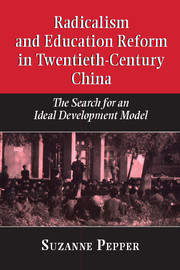Book contents
- Frontmatter
- Contents
- Acknowledgments
- 1 Educational development and the Chinese experience
- Part I The republican era: origins of radical education reform
- 2 Development dilemmas in the republican era: the League of Nations report
- 3 The inheritance
- 4 The modern school system
- 5 The critical backlash
- 6 Early communist alternatives: Jiangxi and Yan'an
- Part II Learning from the Soviet Union
- Part III Cultural revolution and radical education reform
- Appendix: the Hong Kong interviews
- Select bibliography
- Index
2 - Development dilemmas in the republican era: the League of Nations report
Published online by Cambridge University Press: 04 August 2010
- Frontmatter
- Contents
- Acknowledgments
- 1 Educational development and the Chinese experience
- Part I The republican era: origins of radical education reform
- 2 Development dilemmas in the republican era: the League of Nations report
- 3 The inheritance
- 4 The modern school system
- 5 The critical backlash
- 6 Early communist alternatives: Jiangxi and Yan'an
- Part II Learning from the Soviet Union
- Part III Cultural revolution and radical education reform
- Appendix: the Hong Kong interviews
- Select bibliography
- Index
Summary
The League of Nations 1932 report on Chinese education provides a direct link between past and present development concerns. Terms of reference are not always the same, but the issues elaborated in the report are clearly identifiable as antecedents of those that defined the Third World's decades of development between 1960 and 1980. A new Chinese government established in the late 1920s by the Nationalist Party (Guomindang) had invited the League of Nations to help prepare a plan for comprehensive education reform. This would have been one of several such major revisions that marked the growth of Western-style education in China after its widespread introduction around the turn of the century. A mission of “experts” consequently spent three months in China during 1931. Read more than half a century later, their report and proposals not only reflect the early thinking of the international development community but stand also as a benchmark against which to evaluate China's precommunist education system.
The report was highly critical. It defined China's modern schools as “independent organisms modelled on the forms and ideology of private education instead of being included in an organised system of public education.” Reiterating the conventional wisdom of that time, the authors blamed this weakness on China's lack of public spirit and social organization. Specifically within the educational realm, the origins of the weakness were seen as twofold. It was rooted, first, in the tradition of family, clan, and village schools inevitably confined by the narrow interests and private financial sources which supported them. Traditionally, the state had been concerned not with education as such but with administering the civil service examinations, which controlled access to public office and political power.
- Type
- Chapter
- Information
- Radicalism and Education Reform in 20th-Century ChinaThe Search for an Ideal Development Model, pp. 37 - 45Publisher: Cambridge University PressPrint publication year: 1996



